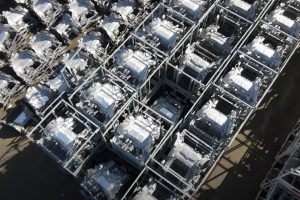- 🔋 Redwood Materials is optimistic about long-term success in battery recycling despite the EV market slowdown.
- 📉 The current EV industry is facing soft consumer demand and lower metal pricing, which affects battery production.
- 🌱 Redwood Materials partners with major companies like Toyota and Panasonic for recycling and refining battery components.
- 🇺🇸 The company aims to localize battery production in North America to align with the on-shoring trend in the EV market.
- 🏆 Redwood maintains strong partnerships with significant automakers and battery cell manufacturers, positioning it as a leader in the industry.
As the electric vehicle (EV) industry experiences a dip in consumer demand, companies at the forefront of sustainable technology must adapt and innovate to maintain their trajectory. Redwood Materials, a leader in battery recycling, has positioned itself to not only weather the current market landscape but also to thrive in it. Let’s delve into how Redwood Materials is navigating these challenges and setting the stage for long-term success.
Understanding the EV Market Slowdown
Current Industry Challenges
The EV industry is currently grappling with two significant challenges:
- Soft Consumer Demand: There has been a noticeable decline in consumer interest and purchases of electric vehicles.
- Lower Metal Pricing: Essential metals for battery production, such as nickel, cobalt, and lithium, have seen a reduction in market prices.
These factors contribute to a challenging environment for battery and EV manufacturers, affecting overall production and sales.
Redwood Materials’ Strategic Response
Embracing Recycling to Meet Future Demands
Redwood Materials is undeterred by the current market challenges. Instead, the company sees an opportunity in bolstering its recycling operations. By focusing on the sustainable recycling of metals, Redwood Materials can mitigate the impact of fluctuating raw material costs. This not only positions them as environmentally responsible but also as economically savvy, reducing reliance on newly mined materials.
Strategic Partnerships
Key to Redwood’s resilience is its robust partnership network:
- Toyota and Panasonic: Collaborating with these giants enables Redwood Materials to refine recycled metals into critical components, ensuring a steady supply chain.
- Broader Industry Connections: The company has cultivated relationships with nearly every major automaker and battery cell manufacturer in the U.S., fostering a network that reinforces its industry leadership.
Localization of Battery Production
Aligning with On-Shoring Trends
Redwood Materials plans to localize battery production across North America. This strategy not only aligns with political and economic trends favoring domestic manufacturing but also enhances supply chain resilience. Here’s why this matters:
- Reduced Dependency: By producing locally, Redwood diminishes its dependency on international supply lines, which can be volatile due to geopolitical tensions.
- Boosting Local Economies: Local production supports regional economies, creating jobs and fostering industrial growth.
Conclusion: Poised for Long-Term Success
Redwood Materials exemplifies how strategic foresight and adaptability can guide a company through industry headwinds. By leveraging recycling technology, forming strategic partnerships, and focusing on local production, Redwood is not just surviving the EV industry slowdown but is set to emerge stronger.
In these dynamic times, Redwood Materials’ approach provides valuable lessons on sustainability, innovation, and resilience.





